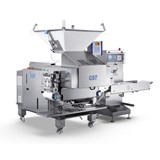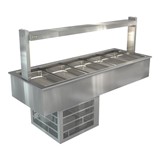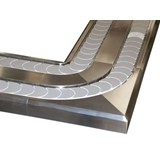In the bustling world of the hospitality industry, commercial coffee machines have become indispensable. These robust machines serve as the backbone of cafes, restaurants, hotels, and countless other establishments, where a perfect cup of coffee can make or break a customer's experience.
The importance of technological advancements in this realm cannot be overstated. As demands for consistency, speed, and quality rise, coffee machine manufacturers are continually innovating to meet these expectations. Today, we delve into the pivotal innovations that are shaping the future of commercial coffee machines.
I. Smart Technology Integration: IoT and App-Controlled Brewing
In an era defined by rapid technological advancement, even the most traditional elements of our daily lives are experiencing a digital makeover. The commercial coffee machine industry is no exception. Within this sphere, the integration of Smart Technology, specifically the Internet of Things (IoT), and the advent of app-controlled brewing have ushered in a new era of efficiency, convenience, and quality. In this section, we delve into the nuts and bolts of these innovations, shedding light on their implications for the coffee industry.
1. Explanation of IoT (Internet of Things) and its relevance in coffee machine technology
The Internet of Things, or IoT, refers to the interconnected network of everyday objects and devices via the internet. Its application extends far beyond our smartphones and smart homes, finding a place of prominence in the world of commercial coffee machines. At its core, IoT in coffee machines involves embedding sensors, software, and connectivity features that enable these machines to communicate and share data.
The relevance of IoT in coffee machine technology lies in its ability to transform these once-static devices into intelligent, data-driven systems. Through a network of sensors and data-sharing capabilities, coffee machines can monitor and manage various aspects of their operation in real-time. This includes tracking water temperature, pressure, brewing time, and even the status of coffee bean supplies.
The implications of IoT in coffee machines are profound. Coffee shop owners and managers can access a wealth of data on machine performance and coffee quality, allowing for proactive maintenance and quality control. The end result? A seamless, consistent brewing experience that meets the high standards of today's discerning coffee aficionados.
2. Examples of how IoT is revolutionizing coffee machine operation and maintenance
To illustrate the real-world impact of IoT, let's consider a few practical scenarios:
- Predictive Maintenance: IoT-equipped coffee machines can detect issues or wear and tear before they cause a breakdown. For instance, a sensor may identify a drop in water pressure, signaling the need for descaling. This proactive approach minimizes downtime and repair costs.
- Inventory Management: IoT-enabled coffee machines can monitor coffee bean levels and automatically reorder supplies when running low. This ensures that coffee shops never run out of their signature blends during busy hours.
- Energy Efficiency: By analyzing usage patterns, IoT technology can optimize power consumption. Machines can reduce energy consumption during off-peak hours and ramp up performance during busy periods, resulting in cost savings and reduced environmental impact.
3. Benefits of app-controlled brewing, including remote monitoring, customization, and efficiency improvements
Beyond IoT, the integration of app-controlled brewing takes coffee machine technology a step further. With the help of dedicated mobile applications, baristas and business owners can harness the power of connectivity to enhance their operations:
- Remote Monitoring: App-controlled coffee machines allow users to remotely monitor their devices, providing real-time updates on brewing progress, machine status, and maintenance needs. This means that baristas can step away from the machine without sacrificing quality or consistency.
- Customization: These apps often provide a range of customization options, allowing users to fine-tune their coffee recipes. From adjusting brewing temperature and pressure to experimenting with grind size, the possibilities for creating unique coffee profiles are virtually limitless.
- Efficiency Improvements: App-controlled brewing enables precise control over the brewing process. This not only leads to consistent, high-quality coffee but also reduces waste. Baristas can dial in the exact parameters needed for each cup, minimizing over-extraction or under-extraction issues.
II. Eco-Friendly Designs: Sustainability in Coffee Machine Manufacturing
Coffee machines have long been an integral part of the hospitality industry, serving up that essential morning brew and catering to the caffeine cravings of countless patrons. However, the conventional manufacturing processes associated with these indispensable devices have often carried a significant environmental footprint. In this section, we delve into the environmental impact of traditional coffee machine manufacturing and explore how the industry is transitioning toward more sustainable practices.
1. Environmental Impact of Traditional Manufacturing
- Traditional coffee machine production has historically relied on resource-intensive processes. The extraction of raw materials, such as metals and plastics, often involves energy-intensive mining and refining.
- Mass production techniques, while efficient in meeting demand, generate substantial waste. This includes both the manufacturing waste and the eventual disposal of outdated machines.
2. Sustainable Materials and Production Methods
- The shift towards eco-friendliness has led coffee machine manufacturers to explore sustainable materials. For instance, the incorporation of recycled and biodegradable materials into machine components.
- Additionally, some companies have adopted more energy-efficient production methods, reducing their carbon footprint during the manufacturing process.
3. Highlighting Eco-Friendly Features
- Energy Efficiency: Modern coffee machines are designed with energy conservation in mind. This means efficient heating systems, improved insulation, and advanced standby modes to reduce energy consumption during idle periods.
- Recyclability: Sustainability isn't just about production; it's also about the end of a product's life cycle. Many coffee machines now feature components that are easily recyclable, reducing the burden on landfills.
- Waste Reduction: Innovations in design have led to coffee machines that generate less waste during use. For example, single-serve machines that use compostable coffee pods or models that minimize coffee grounds waste.
III. Precision Extraction: Advances in Brew Consistency and Quality
In the world of commercial coffee machines, the pursuit of perfection is an unending quest, especially when it comes to brew consistency and quality. In this section, we delve into the paramount importance of consistency in commercial settings, explore the cutting-edge innovations such as precision temperature control and pressure profiling, and ultimately, showcase how these advancements elevate the flavor and quality of your favorite cup of joe.
1. The Importance of Brew Consistency in Commercial Settings
- Unwavering Quality: For businesses operating in the coffee service industry, delivering a consistently excellent product is non-negotiable. Each cup of coffee must meet the same high standard, whether it's the first pour of the day or the hundredth.
- Customer Expectations: In today's coffee culture, customers have grown accustomed to a certain level of quality. Deviating from this standard can lead to dissatisfied customers and a tarnished reputation.
- Brand Image: Consistency is not just about meeting expectations; it's also about building and maintaining a strong brand image. A consistent product conveys reliability and professionalism.
2. Innovations in Precision Brewing
- Precision Temperature Control: One of the key advancements in the pursuit of brew consistency is precision temperature control. Traditional coffee machines often struggled to maintain a stable brewing temperature. However, modern commercial coffee machines utilize sophisticated technology to keep the water temperature within a narrow range, typically between 195°F to 205°F (90°C to 96°C). This precision ensures that the coffee grounds are extracted evenly, resulting in a more balanced and flavorful cup.
- Pressure Profiling: Another breakthrough innovation is pressure profiling. This technology allows baristas and coffee aficionados to fine-tune the pressure applied during the brewing process. By varying the pressure at different stages of extraction, it's possible to unlock a broader spectrum of flavors from the coffee grounds. This level of control empowers baristas to tailor each cup to perfection, accommodating the nuances of different coffee beans and roast profiles.
3. Enhancing Coffee Flavor and Quality
The marriage of precision temperature control and pressure profiling isn't just about consistency; it's about achieving exceptional flavor and quality in every brew:
- Balanced Extraction: Precise temperature control ensures that the coffee is neither under-extracted (resulting in sour, weak coffee) nor over-extracted (resulting in bitter, astringent coffee). The result is a balanced extraction that highlights the coffee's unique flavor profile.
- Unlocking Complexity: Pressure profiling allows for the extraction of a broader range of flavors, from bright and fruity notes to deep and chocolatey undertones. This versatility means that commercial coffee machines can cater to a diverse range of coffee preferences.
- Customer Satisfaction: Ultimately, these advancements translate to happier customers. A consistently exceptional cup of coffee can turn a casual coffee drinker into a loyal patron and an occasional visit into a daily ritual.
IV. Modular Customization: Adapting Machines for Specialty Brews
In recent years, the coffee industry has witnessed a remarkable shift towards specialty coffee. No longer is a simple cup of java sufficient; consumers now seek unique and exquisite flavors, leading to a growing demand for diverse brewing methods. This transformation has prompted an innovation wave in the world of commercial coffee machines, with modular customization emerging as a key solution.
The Growing Trend of Specialty Coffee
- Specialty coffee is a movement that celebrates the intricate nuances of coffee beans, highlighting their origin, processing, and flavor profiles. Coffee enthusiasts are no longer satisfied with standardized, mass-produced brews. Instead, they crave unique tastes, whether it's the fruity notes of Ethiopian Yirgacheffe or the deep chocolatey richness of Colombian beans.
- This shift in consumer preference has created a challenge for coffee establishments. The one-size-fits-all approach to brewing is no longer sufficient to meet the demands of a discerning clientele. Coffee shops and restaurants must adapt to this trend by offering a diverse range of coffee experiences, and this is where modular customization comes into play.
Modular Coffee Machines: A Solution for Diversity
- Modular coffee machines are designed with adaptability in mind. Unlike traditional, fixed systems, these machines offer a wide array of options for customization. They come equipped with interchangeable components and brewing modules, allowing baristas to switch between different methods seamlessly. Whether it's pour-over, espresso, AeroPress, or cold brew, these machines can be configured to meet the precise requirements of each brew style.
- The benefits of modular customization extend beyond just catering to the ever-evolving preferences of coffee connoisseurs. They also empower coffee establishments to optimize their operations efficiently. For instance, during peak hours, when speed is of the essence, the machine can be set up for quick espresso shots. Conversely, during quieter times, it can be adapted for more intricate brewing processes, enhancing the overall customer experience.
Benefits of Adaptability for Cafes and Restaurants
- Enhanced Customer Satisfaction: With modular customization, cafes and restaurants can provide customers with an extensive menu of coffee options, ensuring that every guest finds a brew that resonates with their taste preferences.
- Operational Efficiency: These machines streamline operations by reducing the need for multiple coffee makers. A single, adaptable unit can replace several fixed machines, saving both space and maintenance costs.
- Flexibility in Staff Training: Training baristas becomes more straightforward as they can become proficient in operating one adaptable machine rather than multiple specialized ones.
- Future-Proofing: As coffee trends continue to evolve, modular machines can be easily upgraded or expanded to accommodate new brewing techniques or emerging coffee trends, ensuring long-term relevance.
V. User-Centric Interfaces: Enhancing User Experience and Training
In the realm of commercial coffee machines, the evolution of user-centric interfaces stands as a testament to the industry's dedication to improving not just the quality of the brew but also the overall user experience. These interfaces, characterized by touchscreens, intuitive controls, and guided brewing processes, are transforming the way coffee is made and served in cafes and restaurants. In this section, we delve into the significance of these interfaces, exploring their features, benefits, and their impact on barista training and reducing human errors.
The Significance of User-Friendly Interfaces
- User-friendly interfaces have become paramount in the world of commercial coffee machines. In the hustle and bustle of a café or restaurant, time is of the essence, and the ease of operation can significantly impact the efficiency and quality of coffee production. The transition from complex, button-laden control panels to sleek touchscreens and intuitive controls has simplified the brewing process and made it more accessible to both seasoned baristas and newcomers to the coffee industry.
Exploring Touchscreens and Intuitive Controls
- One of the most noticeable advancements in user-centric interfaces is the integration of touchscreens. These responsive and visually intuitive screens allow baristas to easily select brewing options, adjust parameters like grind size and water temperature, and even create custom recipes with a few taps. The elimination of physical buttons and knobs reduces clutter on the machine's surface, making it easier to clean and maintain.
- Intuitive controls go hand-in-hand with touchscreens. These controls are designed with simplicity in mind, enabling baristas to navigate through various brewing options effortlessly. Icons, graphics, and clear instructions guide users through the coffee-making process, ensuring consistency in every cup served.
Guided Brewing Processes
- Guided brewing processes are a game-changer, especially for establishments with a high turnover of staff or those training new baristas. These processes provide step-by-step instructions, from dosing and tamping to extraction and milk frothing. As baristas follow these guides, the likelihood of errors decreases significantly, resulting in a more consistent product.
Impact on Barista Training and Error Reduction
- User-centric interfaces have far-reaching benefits beyond just streamlining the coffee-making process. They play a pivotal role in barista training and skill development. Newcomers can quickly grasp the nuances of coffee preparation, thanks to the clear and straightforward instructions provided by these interfaces. Moreover, experienced baristas can focus on perfecting their craft rather than grappling with complex machinery.
VI. Data-Driven Insights: Leveraging Analytics for Optimal Performance
In the ever-evolving landscape of commercial coffee machines, the integration of data analytics has emerged as a transformative force. This section delves into the pivotal role played by data analytics in optimizing coffee machine performance, shedding light on its multifaceted contributions.
Enhancing Machine Performance Through Data Analysis
- Data analytics involves the systematic collection and examination of various parameters related to coffee machines. These parameters encompass a wide array of metrics, including but not limited to temperature, pressure, extraction time, and water quality.
- By meticulously analyzing these metrics, coffee machine operators can gain a comprehensive understanding of their equipment's performance. This granular insight allows for proactive maintenance and adjustments, ultimately extending the lifespan of the machine.
Efficiency and Resource Management
- One of the most notable advantages of data-driven insights is their ability to optimize operational efficiency. By monitoring machine usage patterns, businesses can identify peak hours and adjust their staffing and resource allocation accordingly.
- Furthermore, data analytics enables the identification of energy consumption trends, leading to informed decisions on energy-efficient practices. This not only reduces operational costs but also aligns with sustainability objectives.
Customer-Centric Customization
- The collection of customer preferences and habits through data analytics empowers businesses to tailor their coffee offerings. For instance, insights derived from customer choices can inform the creation of personalized brews or the addition of new coffee varieties.
- This level of customization resonates with the modern consumer, fostering loyalty and increasing customer satisfaction.
Predictive Maintenance
- Perhaps one of the most impactful applications of data-driven insights is predictive maintenance. By monitoring the wear and tear of components in real-time, businesses can anticipate maintenance needs and prevent unexpected breakdowns.
- This proactive approach minimizes machine downtime, ensuring a seamless coffee service experience for customers.
In a rapidly evolving landscape, commercial coffee machines are undergoing transformative innovations that promise to redefine the standards of coffee preparation in the hospitality industry. As we conclude our exploration of these groundbreaking developments, it's evident that these advancements hold the potential for a brighter and more sustainable future for both businesses and coffee enthusiasts alike.
Enhanced Coffee Quality:
- Precision extraction methods, such as temperature control and pressure profiling, are ushering in an era of unparalleled coffee quality.
- The ability to fine-tune every aspect of the brewing process ensures that each cup of coffee is a masterpiece of flavor, aroma, and consistency.
Sustainability at the Forefront:
- The coffee industry's commitment to sustainability is reflected in the eco-friendly designs of these commercial coffee machines.
- Utilizing sustainable materials and manufacturing processes reduces the environmental footprint of these machines, making them a responsible choice for businesses.
Elevated User Experience:
- User-centric interfaces, featuring intuitive controls and guided brewing processes, are enhancing the overall coffee machine experience.
- These improvements not only simplify operation but also aid in the training of baristas, reducing the potential for human errors.
Data-Driven Efficiency:
- The integration of data analytics into coffee machine performance allows businesses to make informed decisions.
- From monitoring machine usage to understanding customer preferences, data-driven insights optimize operations and enhance customer satisfaction.
In conclusion, the innovations shaping the future of commercial coffee machines represent a significant leap forward for the hospitality industry. These advancements, including smart technology integration, sustainability measures, precision extraction, modular customization, user-centric interfaces, and data-driven insights, collectively enhance every aspect of the coffee-making process. They promise a future where coffee quality reaches new heights, sustainability becomes the norm, user experience is streamlined, and operational efficiency is optimized. As coffee enthusiasts and businesses alike benefit from these transformative technologies, the future of coffee service looks promising, characterized by exceptional brews, responsible practices, and unparalleled customer satisfaction.




-160x160-state_article-rel-cat.png)







-160x160-state_article-rel-cat.png)

















